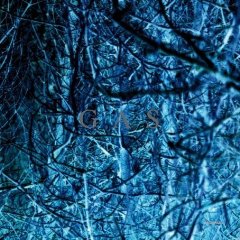This elegant little box with a bleached midnight-blue close-up of tree foliage (from Konigsforst in Germany to be precise) contains four slabs of the most sublime, eerie, beguiling and beautiful electronica you are ever likely to hear. One word, written in white, raised- all you need to know: GAS.
Electronica really is a misnomer, however. Wolfgang Voigt attempts to pull together various strands of Germanic cultural history – schlagen, polka and classical and indeed one way of trying to evoke how this music is to re-imagine it as a post-rave version of Casper David Friedrich’s painting From The Summit. “I try to reduce the material to its basic aesthetic structure by using different zoom, loop and alienation techniques in order to release it from its original meaning and context”. GAS is based on a love of pastoral myth and from former hippy days spent tripping in the above woods – a distorted connection with the past through the sound of the future with the cover art of hypnotically coloured photography (and additional photographs enclosed in the box) acting as a portal to the worlds within.
Voigt is one of the principle players in minimalist techno, uncomprehendingly influential, consistently inventive. As the main man behind Cologne label Kompakt, he is responsible for managing an independent empire but GAS will always resound as his greatest artistic success. This ‘softly’ remastered box contains all four albums released over a period of five years from 1995 until the final instalment (so far) of Pop in 2000.
The sound is staggeringly unique. Hard 4/4 beats heard from a thousand submerged miles away, carried through an ether of (literally) Wagnerian drones. Brass swells mingle with hallucinatory treatments in a mix that at first seems somehow… wrong. When I first heard Konigsforst a decade ago, I remember fiddling with the stereo, checking the headphones confused as to what the fuck was going on in my ears. It is the electronic equivalent of My Bloody Valentine’s ‘To Here Knows When’, a miasma of beguiling sound. There is a mystical, mythical feel to the work. The vagueness of the sounds and the elevated emotion bring forth an edgy wide-eyed wonder, though it’s never childlike. GAS captures an adult heart; this is a music that erases your self after it has been formed. You feel dwarfed by it. Equally, GAS is oddly redolent of David Lynch both sonically and philosophically- an acknowledgement of an ungraspable something underneath the labyrinthian canopies of endless trees- a world you can enter whenever you wish but somehow retain a sense of being an alien.
The first three CDs show a general perfecting of GAS sound. GAS was followed by Zauberberg (translated as Magic Mountain), culminating in the aforementioned Konigsforst. Critically, the third long-player seems to be the high watermark of the project especially on the 15 minutes of bewitching and humbling pastoral edginess of the fourth track (all tracks on all albums are untitled). This is music that steps beyond the evocative – you can do nothing but live within this noise.
Interesting too are the links to minimalism. Philip Sherburne has kick-started a discussion about the merits of contemporary minimalism (expanding out into an exploration of dance music in general), questioning the merits of a genre that, once radical, now pitches a queer pleasure-free austerity, especially within the heart of Berlin. Mark Fisher and Simon Reynolds have run with this, looking at a distinct lack of club energy (12 Hour Party People as Fisher wittily calls it) while Reynolds has explored a new demographic of comfortable artisans, happy in creative work and not requiring the expulsion of energy that rave allowed in such socially dire times.
Voigt and GAS demonstrate the possibilities – austerity replaced by myth. It’s only in retrospect that you realise how little is going on in GAS. It’s not stark, but there are hardly layers up on layers of detail either. What is perplexing is the minimal as maximal approach. Just a few layers, but everything made to swell, disorientate and confuse and seduce. Minimal does not need to mean stark, and this is irresolutely simple but complex music
The last CD, Pop ushers in a drastic metamorphosis of sound (but not atmosphere). Seemingly composed of the forest itself, it is impossible to discern the sound sources. The orchestral samples have seemingly vanished to be replaced by synth washes with wildly processed streams and wind. At least, that’s what it could be. Or maybe a million other things.
This all misses the point though. I am not someone who ever uses the word masterpiece or considers genius to even exist as a concept. Yet a decade of living with GAS has done nothing but exaggerate the power of this unparalleled and sublime music. Just £20 and you can get lost forever.


